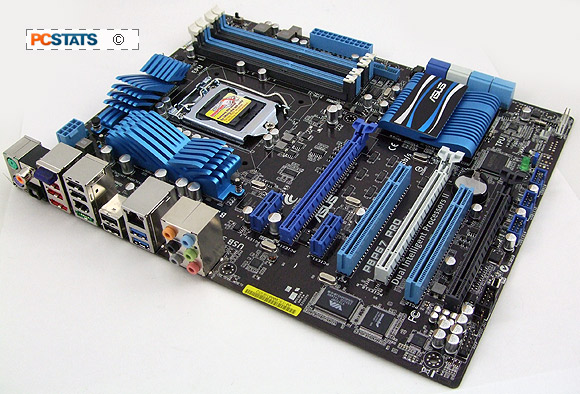
|
The ASUS P8P67 Pro motherboard is a pretty standard platform with a good feature set, ideal for mainstream overclockers and gamers.
75% Rating: 
|
|
|
|
Home >
Reviews >
Motherboards >
ASUS P8P67 Pro |
|
|
Conclusions and Total System Power Draw
PCSTATS
measures total system power draw (watts) with the aid of an Extech 380803 AC
Power Analyzer and A-PFC compliant Seasonic SS-760KM power supply. The meter is placed
between the 120V AC outlet and the PC power supply and the computer stressed.
Total system power draw is recorded and compared to the PC's idle state.
| Total System Power Draw |
|
Idle
|
CPU
Loaded |
GFX
Loaded |
|
Intel Core i5
2500K
nVidia Geforce GTX470
|
113W
|
157W
|
272W
|
|
|
(Idel @ desktop) |
(via Prime95) |
(via
3DM06) | |
The ASUS
P8P67 Pro system draws 113W while idle at the desktop. Under 100% CPU load
conditions with Prime95, total system power draw jumps to 157W. 3DMark06 pushes
power draw to a peak of 272W with a Geforce GTX470 installed.
Conclusions: ASUS P67 Motherboard
The ASUS P8P67 Pro motherboard is a good platform to build
a nice gaming or run-of-the-mill computer system with. Regardless of the new
advances in chipsets since the emergence of the Intel P67 chipset, it has to be
said that the P67 still offers a lot of value. Considering that value, a board
like the P8P67 Pro proves itself to be an economical way of assembling an Intel
LGA1155 PC that competes with Intel Z68 platforms in the benchmarks. The reason
is simple, both chipsets are essentially the same core logic.
If you plan on installing a good graphics card, you can
save money with an Intel P67 based motherboard over a more expensive Z68
motherboard. It's as simple as that.

Compared to newer Intel Z68 motherboards, an Intel P67
platform also affords much the same SLI/Crossfire multi-videocard capability. If
you're a gamer who likes to overclock, there's really no need to spend more cash
on an Intel Z68 platform with onboard integrated graphics features you won't be
using, is there?
Bottom line, let the previous couple pages of
application benchmarks serve as a reminder that newer chipset model numbers
don't always mean better performance figures. Features are easy to add, but raw
processing performance is what a computer draws on every day of the week.
Although the ASUS P8P67 Pro is perhaps a little too
overclocking focused and rough around the edges in some respects, not to mention
strewn with excessive marketing names for features a general PC user will find
of little substance.... the P8P67 Pro has the right features where it counts. In
this day and age, a good amount of USB 3.0 is key. The same can be said for SATA
III ports. Users with smart phones will certainly appreciate the integrated
Bluetooth capability. To sum up, although the ASUS P8P67 Pro made a very bad
initial impression with us on the marketing side, on the whole it is a nice
board and well worth your consideration. Recommended.
Find out about this and many other reviews by joining
the Weekly PCstats.com Newsletter today! Catch all of PCSTATS
latest reviews right here.
Related Articles
Here are a few other articles that you might enjoy as
well...
- ASUS P8H67-M Evo Intel H67 Express Motherboard
Review
- ECS H67H2-M Black Edition Intel H67 Express Motherboard
Review
- Biostar TH67XE Intel H67 Express Motherboard Review
- Gigabyte GA-P67A-UD7-B3 Intel P67 Motherboard Review
- Gigabyte GA-Z68X-UD5-B3 Intel Z68 Motherboard Review
- Gigabyte GA-Z68XP-UD3-iSSD Intel Z68 Motherboard &
Intel 20GB SSD Review
- MSI P67A-GD65 Intel P67 Motherboard Review
- ECS P67H2-A Black Extreme B3-stepping Intel P67 Motherboard
Review
- Gigabyte GA-P67A-UD4-B3 Intel P67 Motherboard Review
|
